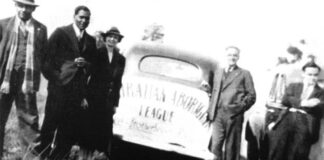The federal government is currently in the middle of a six week round of “consultations” with Aboriginal people on the future of the NT Intervention. This process is a sham.
A discussion paper released by government called Stronger Futures makes it clear that key Intervention measures are not up for negotiation. These include compulsory Income Management, the power of Government Business Managers, the abolition of Community Development Employment Projects and the push for long term leases over Aboriginal township land.
The government needs new legislation to replace Intervention laws, which expire in July 2012. This process is designed to fabricate consent for a second Intervention.
I have visited community consultations, seeing the overbearing involvement of Government Business Managers and local Shire bosses and consistent attempts to restrict discussion. Officials facilitating the meetings strongly emphasise the “achievements” of the intervention so far.
But where Aboriginal people are organised and assertive, the meetings have become important sites of protest.
Resistance
Just five days after the launch of Stronger Futures, Indigenous Affairs Minister Jenny Macklin and a team of bureaucrats set off on a whirlwind tour. In Tennant Creek where the first session was held, no attempt was made to give notice to any towncamp residents. Astonishingly, Macklin’s staff explained the lack of notice as a “security precaution” to protect the Minister.
But local activist Dianne Stokes, who has led a campaign to oppose a nuclear waste-dump on nearby Aboriginal land, quickly got the word out and 75 people attended the meeting.
Tennant Creek residents spoke passionately about the starvation of homelands and outstations since Commonwealth funding began to be withdrawn in 2009—part of an attempt to force people to migrate to urban centres, or one of the 20 “hub towns” earmarked for investment.
Stokes and others demanded resources to sustain a future for their communities—without having to accept destructive projects like the nuclear dump.
In Maningrida, residents forcefully rejected the government’s push for a long-term leases over their township land. The meeting took place following disgraceful revelations that money from the Aboriginal Benefits Account, sourced from royalties from mining on Aboriginal land, is being used to pay rent to communities who agree to sign leases.
Reggie Wurrudjal, a traditional owner for Maningrida said: “The intervention over the last four years now, I haven’t seen anything done. It should be scrapped altogether. People are putting a lot of concerns to the Minister here, it’s not Closing the Gap.”
“By signing a lease, I’ll be handing over decision making to the government. I’ll have no power whatsoever, no input into my community. I’m just losing my land.”
At Amoonguna, there were demands for a return to community based employment and training programs with proper wages and conditions. Unemployment has skyrocketed and young men and women on CDEP complained of being paid through Centrelink and the BasicsCard. They were used as cheap labour for the government’s $672 million Strategic Housing and Infrastructure Project (SIHIP) while receiving no ongoing qualifications or job.
In response the Government Business Manager facilitating the meeting simply urged young people to take up work outside the community.
The Gurindji people living at Kalkaringi and Daguragu held a strike against the Intervention in 2010 and have led protest meetings in Darwin.
Community spokesperson John Leemans told their consultation meeting on July 27:
“The NT Intervention must end immediately. It is a violation of our human rights, our integrity and liberty. The world is condemning it through the UN. The churches and unions are condemning it.”
“We want control of our land back. We want to be able to practice our culture and speak our language. We want jobs created so we can work in our community. There is a big movement of people into Darwin and Katherine, because there are no jobs in the community any more. This is exactly what we don’t want—people must be able to live and work on their homelands.
“We have a brain to think for ourselves on how to run our own communities. It’s called self-determination. But since the Intervention everything has been taken away from us”.
Leemans concluded, “We know Minister Jenny Macklin stayed away from Gurindji country because we are strong and organised against her Intervention. We are going to keep this battle going. We are organising a protest on Freedom Day, 45 years since our old people walked off Wave Hill station”.
By Lauren Mellor





